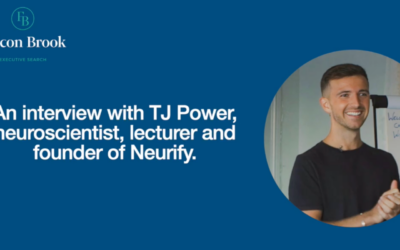Working for larger, established businesses is often an important career staging post. However, the blueprint for senior career development has been changing steadily and smaller entrepreneurial and start-up businesses increasingly appeal.
Covid accelerated this shift and on a daily basis, I speak to senior people as they re-evaluate career options.
They want flexibility and a better balance across all aspects of their lives. They experienced the efficiencies of not having to commute for hours in crowded transport and the mental health benefits of taking time out during the day to nurture themselves.
Recently established businesses also speak to a changing professional agenda, as we discovered when we spoke to Tim Mendelssohn, MD of Spark Commodities, and Mark Hives, Strategist at Trailstone Group.
In the ‘cool’ rankings, Spark has the advantage of being both a start-up and a tech innovator. The company’s visually dynamic platform promotes price discovery in the physical LNG market via a set of intuitive tools based and relevant contracts.
“We’re taking a customer focused approach to a part of the commodities industry that hasn’t changed significantly for years,” Tim Mendelssohn told us.
“Our technology simplifies price discovery in a world where there is a constant and increasing information overload. This is especially relevant now that traders and analysts have limited resources and more opportunities to assess.”
Tim’s move to Spark was founded on a strong entrepreneurial mindset.
“Although I loved it, I was a trader by chance rather than planning. I had a business at university, and, as part of that experience, ended up meeting Richard Reid, one of the Innocent smoothie founders. I had a place on the BP grad scheme so I asked what he would do in my position? He said I should learn as much as I could for five years and then do my own thing if the right opportunity came up. For me, Spark was that opportunity.”
While that makes it sound easy, the reality of running a start-up business is very different.
“The required skill set is expansive. Trading taught me to deal with pressure, manage risk and many other things. It didn’t help me with creating a marketing strategy and launching a tech product. I underestimated the degree of juggling but also how much I would enjoy that part of the role.”
Tim identifies a number of factors that combine to create a business that is at once exciting and also challenging.
“In the current macro-environment, being marginally better doesn’t cut it. You have to be fundamentally better and compete against organisations with more resources, a strong legacy and a well-established customer base. We aim to make up for that with a great set of tools and an ability to build what our customers need, when they need it.”
To deliver these tools requires getting the right blend of technical excellence and deep market insight.
“Building simple products is difficult. Almost the simpler they are, the harder they are to build. We’ve deliberately hired a strong tech team and kept the commercial side lean so that we’re positioned to be agile and cost competitive. Our tech team come from a range of backgrounds. They have the track record to deliver strong technologies and approach the market in an unconstrained way.”
Spark doesn’t outsource the tech development so they can focus on what customers really want and at great speed: “We recently built a tool in two weeks to help assess the possible impact of US Gulf Coast’s cancellations on LNG flows, a development that is massively important to the LNG industry. This ensures our customers always have the tools to support decision-making.”
Where Spark is supporting commodities trading by combining industry insight with fresh tech know-how, Trailstone employs commodity professionals with extensive industry expertise and empowers them to explore new potential.
“The story really starts almost 20 years ago, when many of the employees who created Trailstone in 2013 first worked together during the commodity market’s big super-cycle,” said Mark Hives, who joined Trailstone around four years ago. “Then came 2008 and we all dispersed.”
The team track record was undeniable and Trailstone easily attracted initial investment of $500 million. Mark said he did not hesitate to join: “I’ve been working in the commodity sector for almost 30 years. I knew if those guys couldn’t make it work, then nobody could. What you want from a job when you’re 45 is very different from when you’re 25. Now I want to work with people who just get the job done.”
Trailstone’s success in ESG trading appeals to senior talent looking for a move into a business where they can make an impact and transform their values into action with a more agile and experimental approach.
“ESG was a natural evolution. We were already using algorithms for short term power trading, why not extend them for ESG? It was a huge success, so we’ve expanded the operation.”
In the past seven years, close-knit Trailstone teams located across the world developed the business model to seize opportunities fast.
“Our business strategy has evolved from investing in CCGT plants to trading-led activities, and then onto a combination of trading to provide the positive cash flow to support the growth of our ESG business. Renewable generation optimisation is flourishing in our base in Berlin and we can now see the potential in America. The output from those wind farms could be optimised in the same way that we’ve done in Berlin.”
Trailstone’s strategy of attracting a deeply experienced team that can work autonomously to spot new opportunities applies data at its core.
“Today you have to be able to program. The next step will be some kind of artificial intelligence. That’s what I’ve been working on during lockdown. It’s like in medieval times people couldn’t write and would hire a scribe. When people learnt how to write, scribes went out of business,” Mark continued.
“We use micro and macroeconomics, knowledge of commodities markets and coding capabilities to develop proprietary models that are at the heart of Trailstone. My particular niche in life is forecasting within a six month to two-year time frame. It’s extraordinary the level of detail to which a forecast can be accurate if you’re looking in the right place and are open to seeing the similarities between markets that some people wouldn’t think to compare.”
Mark outlines a number of stories that show how he applied economic patterns to predict outcomes with extraordinary results.
“When I was an equity researcher, I predicted British Energy would have to reduce their nuclear reactor output to 70% because their reactors were cracking, and that the share price would fall. Shortly after, it happened, almost exactly as I’d said.”
More recently in 2016, Mark forecast that the US might import LNG in 2019 or 2020 if a recession occurred. “Even I struggled to believe the output of my models, but that’s exactly what occurred. In a lot of businesses, these predictions would be side lined as a fluke. Trailstone is built on people who are open and able to look at information differently. I come up with forecasts that sound crazy, and then they come true.”
Many larger organisations recognise the need to replicate the cultural appeal of start-ups and entrepreneurial businesses in order to attract and retain the best senior talent.
These are some of the aspects to consider for those established businesses looking to attract senior talent with entrepreneurial flair:
- Greater autonomy to explore new lines of development with fast sign-off.
- Introduction of tools that facilitate collaboration and knowledge share.
- Involvement in driving the strategy for all aspects of ESG.
- Flexibility to balance work and personal priorities and also in the setting and design of remuneration and benefits.
- Flatter reporting lines and increased matrixing of teams and resources.
- Increased diversity of workforce to up the creative tempo and challenge established ways of working.



